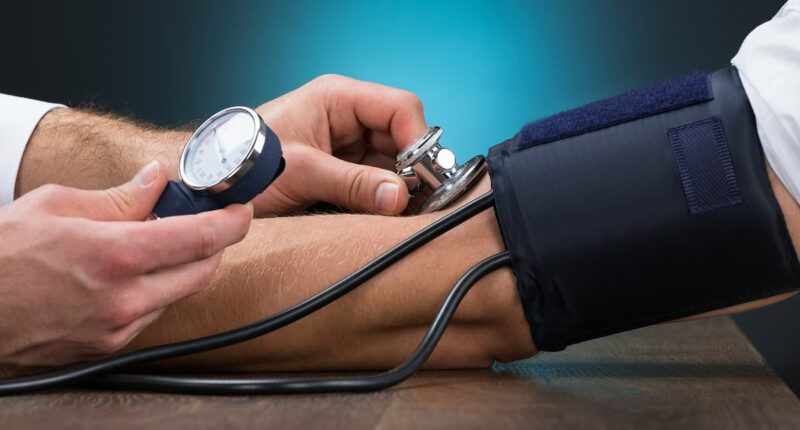Share this @internewscast.com
A revolutionary new medication is showing promise in providing round-the-clock protection against high blood pressure, particularly during early morning hours when the risk of heart attacks and strokes is at its peak.
Blood pressure is significantly impacted by the hormone aldosterone, which is produced by the adrenal glands. This hormone plays a crucial role in regulating blood pressure by managing sodium and potassium levels in the body.
However, some individuals produce an excess of aldosterone, leading to the retention of salt and water, which in turn elevates blood pressure.
While current medications have been able to prevent aldosterone from functioning, the innovative drug, baxdrostat, takes a different approach by directly inhibiting its production.
A comprehensive international study, known as the Bax24 trial, involved 218 participants from 79 different locations worldwide.
These participants were all dealing with treatment-resistant high blood pressure, meaning their condition remained uncontrolled despite taking at least three other types of medications.
The study, was led by Professor Bryan Williams from University College London (UCL) and concluded that the medicine was effective for 24 hours.
Prof Williams, a professor of cardiovascular science, said: ‘The trial results are quite remarkable both in terms of the magnitude of blood pressure reduction and the fact that it was sustained across the entire 24hr period

A new trial has shown the promising micracle drug baxdrostat can lower stubborn blood pressure for a full 24 hours
‘The effectiveness of this drug is unprecedented and suggests that the hormone aldosterone, which the drug targets, is playing a very important role in driving up blood pressure in many of the patients we struggle to control with existing treatments.
‘This is a real advance in our understanding of treatment resistant hypertension and a major breakthrough in new treatment options.
‘So many people could potentially benefit from this new treatment.’
In the study, subjects either took baxdrostat or a placebo once daily in a tablet form, alongside their usual treatment.
Their blood pressure was measured using 24-hour blood pressure monitoring (ABPM), which measures blood pressure regularly throughout the day and night.
The researchers said the small wearable device gives a more accurate measure of control than a clinic reading.
After 12 weeks, people taking baxdrostat had a very substantial reduction in blood pressure throughout the entire day.
This includes throughout the night and in the early morning, when the risk of a heart attack and stroke is highest.
They recently presented their results at a late breaking science session at the American Association Scientific Sessions in New Orleans.
It the follows the previous trial which included 800 patients that revealed the promising effects of the game-changing drug.
In the earlier trial patients taking baxdrostat saw their blood pressure fall by about nine to 10mmHg more than those taking a placebo after 12 weeks.
About four in ten patients reached healthy levels compared to fewer than two in ten on the placebo, and there were no unanticipated safety issues.
Previous studies suggest this kind of reduction can slash risk of coronary heart disease by 17 per cent, stroke by 27 per cent, heart failure by 28 per cent and death by 13 per cent.
It’s estimated 14 million people in the UK live with high blood pressure, but in half of these cases it is uncontrolled or resistant to treatment, even when taking a cocktail of two or three different drugs.
These people are at a higher risk of serious problems such as heart attack, stroke, kidney disease and an early death.
Worryingly, the British Heart Foundation says many people in the UK may be living with undiagnosed high blood pressure.
Symptoms include headaches, blurred vision, chest pain, nose bleeds, according to the NHS.
We’re more likely to get high blood pressure as we get older, but there are certain other risk factors.
These include having a family history of high blood pressure, your ethnicity, having an unhealthy diet, being overweight, smoking, drinking alcohol and stress.
If you think you have high blood pressure you can get it checked at a pharmacy or your local GP surgery.
Many pharmacies will offer free blood pressure checks for people who are aged 40 or older.
Baxdrostat could be available on the NHS as early as next year, with manufacturer AstraZeneca preparing to apply for regulatory approval within months.












